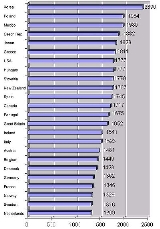
Working time
Overview
Wage labour
Wage labour is the socioeconomic relationship between a worker and an employer, where the worker sells their labour under a formal or informal employment contract. These transactions usually occur in a labour market where wages are market determined...
. Unpaid labors such as personal housework are not considered part of the working week. Many countries regulate the work week by law, such as stipulating minimum daily rest periods
Break (work)
A break at work is a period of time during a shift in which an employee is allowed to take time off from his/her job. There are different types of breaks, and depending on the length and the employer's policies, the break may or may not be paid....
, annual holidays
Civic holiday
A civic holiday, civil holiday, public holiday, legal holiday, or work holiday is a day that is legally recognized and celebrated as a holiday in a particular sovereign state or jurisdictional subdivision of such, e.g., a state or a province...
and a maximum number of working hours
Eight-hour day
The eight-hour day movement or 40-hour week movement, also known as the short-time movement, had its origins in the Industrial Revolution in Britain, where industrial production in large factories transformed working life and imposed long hours and poor working conditions. With working conditions...
per week.
Since the 1960s, the consensus among anthropologists, historians and sociologists has been that early hunter-gatherer
Hunter-gatherer
A hunter-gatherer or forage society is one in which most or all food is obtained from wild plants and animals, in contrast to agricultural societies which rely mainly on domesticated species. Hunting and gathering was the ancestral subsistence mode of Homo, and all modern humans were...
societies enjoyed more leisure time than is permitted by capitalist
Capitalism
Capitalism is an economic system that became dominant in the Western world following the demise of feudalism. There is no consensus on the precise definition nor on how the term should be used as a historical category...
and agrarian societies
Agrarian society
An agrarian society is a society that depends on agriculture as its primary means for support and sustenance. The society acknowledges other means of livelihood and work habits but stresses the importance of agriculture and farming, and was the most common form of socio-economic oganization for...
; For instance, one camp of !Kung Bushmen
!Kung people
The ǃKung, also spelled ǃXun, are a Bushman people living in the Kalahari Desert in Namibia, Botswana and in Angola. They speak the ǃKung language, noted for using click consonants, generally classified as part of the Khoisan language family...
was estimated to work two-and-a-half days per week, at around 6 hours a day.
Unanswered Questions

